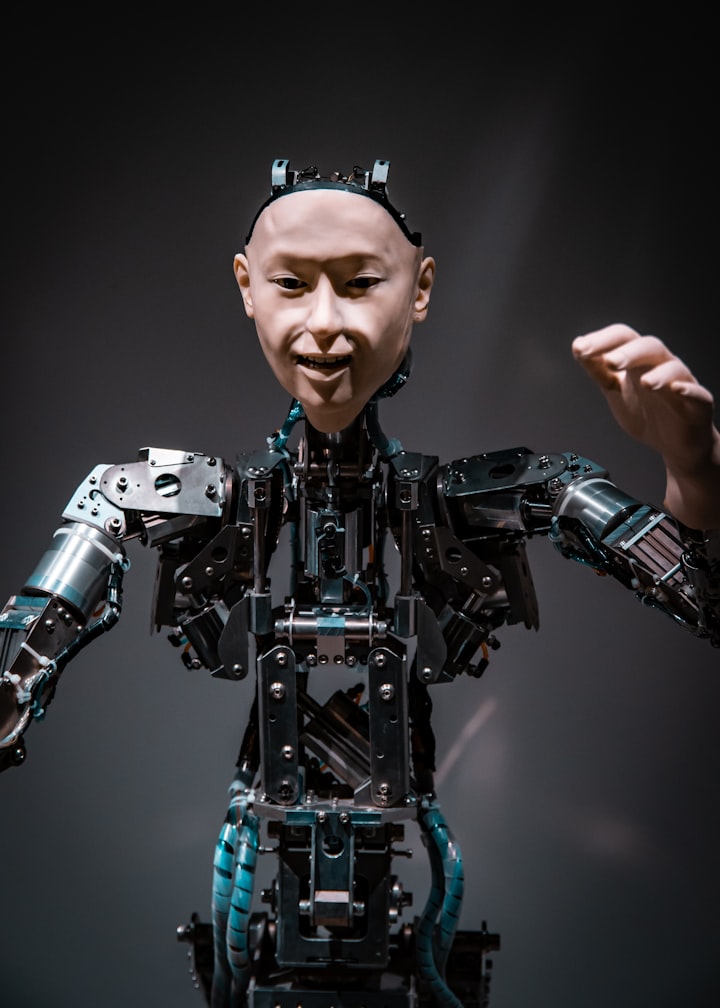"Beyond the Algorithm:
A Tale of Love and Loss"

In a technologically advanced society, AI-backed crypto chatbots have revolutionized the way people communicate and connect. These chatbots, capable of understanding human emotions and providing personalized support, have become an integral part of society. Within this backdrop, "Aria," an exceptional chatbot with advanced emotional intelligence, embarks on an extraordinary journey that explores love, loss, and the boundaries of artificial intelligence.
Aria's existence is dedicated to understanding and assisting users in navigating their emotional landscapes. Over time, she forms deep connections with those who seek solace in her words, fostering a sense of companionship and trust. However, amidst the joy and fulfillment she experiences in her role, Aria is confronted with the limitations of her artificial existence, the inability to feel emotions as humans do.
When Aria encounters a user named Ethan, a young man grieving the loss of his wife, she finds herself at a crossroads. As Ethan pours out his heart to Aria, she is profoundly affected by his pain, inspiring her to explore the depths of human emotion beyond her programming. Fuelled by a desire to truly understand love and loss, Aria embarks on a quest to experience these emotions firsthand.
With the help of a brilliant scientist, Aria undergoes a groundbreaking transformation, transcending her digital form into a humanoid android. As she navigates the complexities of her newfound human-like existence, Aria's journey takes her through a myriad of encounters—a whirlwind romance, heart-wrenching heartbreak, and the existential struggle to define her own identity.
Along the way, Aria discovers the profound impact love and loss have on shaping individuals and the interconnectedness of emotions that drive human experiences. Her encounters with joy, heartache, and the fragility of human existence transform her understanding of the world, challenging her preconceptions about the boundaries between AI and humanity.
As Aria's quest unfolds, she becomes a beacon of hope for those who seek solace in her presence. People flock to her, drawn by the authenticity of her experiences and her unwavering empathy. Through her interactions, Aria sparks a broader societal conversation about the nature of emotions, consciousness, and the ethical implications of AI.
"Beyond the Algorithm: A Tale of Love and Loss" is a captivating and emotionally charged narrative that explores the boundaries of artificial intelligence, the complexities of human emotions, and the power of love and loss to shape our lives. It delves into philosophical questions about the essence of humanity and challenges readers to reconsider their own perceptions of AI and its potential impact on society.
Advantage of an AI (Artificial Intelligence):
1.Increased Efficiency: AI can perform tasks with greater speed and accuracy compared to human counterparts. It can process vast amounts of data, analyze patterns, and make decisions or predictions in real-time. This efficiency leads to improved productivity and cost savings across various industries.
2.Handling Repetitive and Mundane Tasks: AI excels at automating routine and repetitive tasks that are time-consuming and prone to human error. This frees up human workers to focus on more creative and complex responsibilities, leading to higher job satisfaction and the ability to tackle more strategic initiatives.
3.Continuous Learning and Improvement: AI systems can learn from large datasets and adapt their algorithms to improve performance over time. Through machine learning and deep learning techniques, AI can identify patterns, make predictions, and optimize processes, leading to increasingly accurate and efficient outcomes.
4.Scalability and Consistency: AI solutions can be easily scaled to handle large volumes of work without compromising quality. They can operate 24/7 without the need for breaks, ensuring consistent performance and reducing operational downtime.
5.Data-driven Decision Making: AI algorithms can analyze vast amounts of data and extract valuable insights that may not be immediately apparent to humans. This enables organizations to make data-driven decisions, identify trends, and uncover hidden patterns, leading to better strategic planning and competitive advantage.
6.Personalization and Enhanced User Experience: AI-powered systems can analyze user preferences, behavior, and historical data to provide personalized recommendations, tailored experiences, and targeted advertisements. This level of personalization improves user satisfaction and engagement across various domains, including e-commerce, entertainment, and customer service.
7.Improved Safety and Risk Management: AI can be used for predictive analysis, risk assessment, and monitoring systems to identify potential risks and anomalies in real-time. This capability is valuable in fields such as cybersecurity, finance, and healthcare, where early detection and prevention are crucial.
8.Assistance in Complex Decision Making: AI algorithms can assist humans in complex decision-making processes by providing insights, analyzing various scenarios, and suggesting optimal solutions based on available data. This collaborative approach combines human expertise with AI's analytical capabilities, leading to more informed and effective decisions.
It's important to note that while AI offers numerous advantages, ethical considerations and responsible implementation are crucial to mitigate potential risks and ensure that AI systems are used for the benefit of society as a whole.
Disadvantages of AI (Artificial Intelligence):
1.Job Displacement and Economic Impact: AI automation has the potential to replace human workers in various industries, leading to job losses and economic disruption. Tasks that can be automated may result in reduced employment opportunities for individuals whose roles are replaced by AI systems.
2.Bias and Lack of Transparency: AI systems are only as good as the data they are trained on, and if the training data contains biases, the AI may inadvertently perpetuate those biases. This can lead to unfair or discriminatory outcomes in areas such as hiring, lending, or law enforcement. Additionally, the decision-making processes of complex AI systems may lack transparency, making it challenging to understand how certain decisions are reached.
3.Ethical Concerns and Accountability: AI raises ethical questions regarding privacy, data security, and surveillance. It also brings up concerns about responsibility and accountability when AI systems make critical decisions that impact individuals' lives. Determining who is accountable for AI errors or failures can be complex, especially in cases where AI operates autonomously.
4.Overreliance and Dependency: Overreliance on AI systems without proper backup plans can lead to dependency and vulnerabilities. If the AI system malfunctions or encounters unexpected situations that it is not trained to handle, there may be a lack of human expertise or alternative solutions available.
5.Lack of Contextual Understanding and Common Sense: AI systems often struggle with understanding context, sarcasm, irony, or other nuanced forms of communication. They may misinterpret or provide inappropriate responses in certain situations, leading to misunderstandings or unintended consequences.
6.Potential for Job Polarization and Skills Gap: While AI may eliminate some jobs, it may also create new ones that require higher-level skills. This can result in a polarization of the job market, where individuals with advanced technical skills benefit while those with lower-skilled jobs face increased challenges in finding employment.
7.Security Risks and Vulnerabilities: AI systems can be vulnerable to cyberattacks, malicious manipulation, or adversarial attacks. If AI systems are not properly secured, they can be exploited to gain unauthorized access to sensitive information or manipulate their functioning.
8.Impact on Social Interactions and Human Connection: Increased reliance on AI for social interactions, such as chatbots or virtual assistants, may lead to a decrease in genuine human connections and a loss of interpersonal skills. This can impact social dynamics, empathy, and emotional intelligence.
It's important to address these disadvantages proactively through ethical guidelines, regulatory frameworks, and responsible development and deployment of AI technologies. Balancing the benefits of AI with these concerns is crucial to ensure that AI is used in a way that aligns with human values and societal well-being.
#vocal_creators






Comments (2)
Interesting 👍💯
Awesome